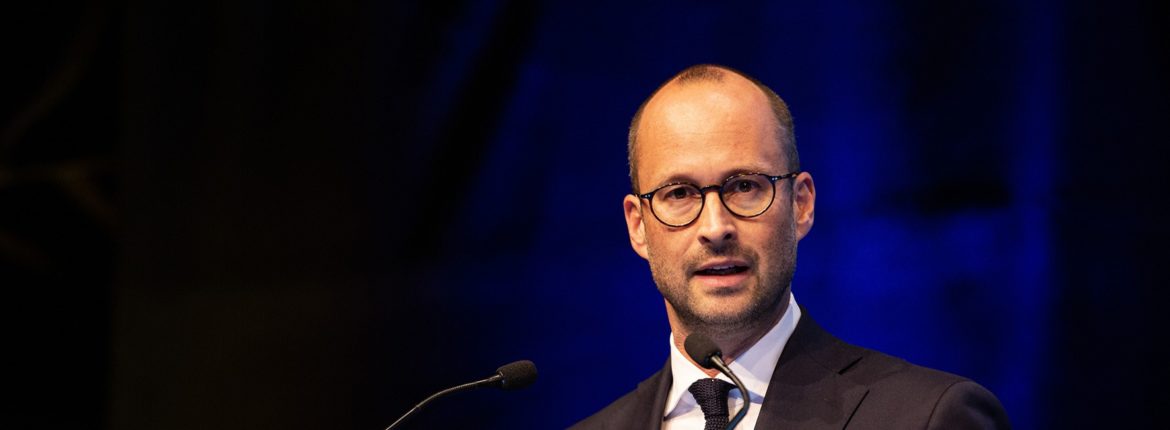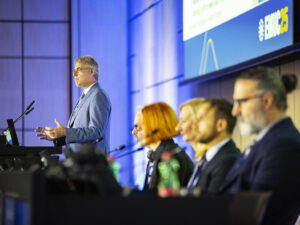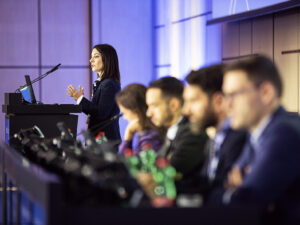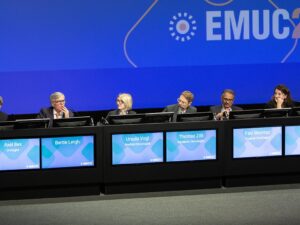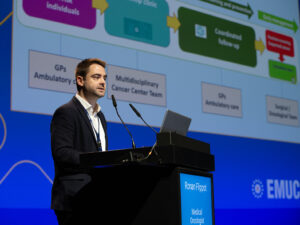A collaborative approach to reviewing trials prevents tunnel vision
Collaborative efforts are required to drive game-changing advancements in medical research and patient care. The upcoming 15th European Multidisciplinary Congress on Urological Cancers (EMUC23) is the perfect platform to showcase and review important GU cancer trial results and new technologies.
Plenary Session 7 on day three (Saturday, 4 November, 08:45 – 10:05) of EMUC23 will feature clinical trial presentations and multidisciplinary discussions. This “Game-changing session” will be chaired by Prof. Axel Merseburger (DE), radiotherapist Prof. Valerie Fonteyne (BE) and medical oncologist Prof. Karim Fizazi (FR).
Merseburger: “Multidisciplinary meetings in onco-urology play a pivotal role in fostering collaboration among various medical specialists dedicated to the care of GU cancer patients. The EMUC Congress excels in bringing together experts from diverse fields such as medical oncology, radiation oncology, surgical oncology, pathology, nuclear medicine, urology, and radiology. This inclusive approach cannot be overstated, as it facilitates a comprehensive and holistic evaluation of complex cases and clinical trial presentations”.
“Each specialist contributes unique insights based on their expertise, allowing for a thorough analysis of treatment options and potential challenges. This collaborative strategy helps prevent tunnel vision. It ensures that all available options, from surgery to radiation to systemic therapies and supportive care, are considered in the context of the patient’s overall well-being.”
GU cancer trials to be discussed at EMUC23
Urologist Prof. Maxine Tran (GB) will present on nephron sparing treatment (NEST) for small renal masses: A feasibility cohort-embedded randomised controlled trial (RCT) comparing percutaneous cryoablation (passing small needles through the skin to freeze the kidney tumour) and robot-assisted partial nephrectomy. This RCT is of significant interest due to the lack of high-level evidence on small renal mass (SRM) management, with previous classical RCTs failing to meet accrual targets.
Prof. Stephen Freedland (US) will share the latest progress on the phase 3 EMBARK trial, whereby trial data has shown that adding enzalutamide to leuprolide cuts the risk of metastasis or death by 50% in patients.
Prof. Merseburger: “This is a hot topic right now as the FDA granted priority review of enzalutamide for nmCSPC with high-risk biochemical recurrence. The FDA decision is expected in Q4 of this year for the new drug application that has been supported by data from this phase 3 EMBARK trial. Discussion remains on the value of PSMA-PET in this situation.”
Medical oncologist Dr. Yohann Loriot (FR) will present details on the THOR study reinforcing the activity of erdafitinib as personalised therapy for metastatic urothelial patients with FGFR mutations. Erdafitinib is included in the current EAU bladder cancer guidelines. The THOR study leads to precision medicine in advanced bladder cancer for 3rd line treatment for patients with EGFR alterations. All metastatic urothelial patients should be tested for FGFR3/2 alterations.
Other trial results that will be presented and discussed by the multidisciplinary panel include TALAPRO-2 and PROpel, as well as an update on PSMA targeting.
Uniting medical experts for innovation and progress
The EMUC23 congress is a collaboration of the European Society for Medical Oncology (ESMO), the European SocieTy for Radiotherapy and Oncology (ESTRO) and the European Association of Urology (EAU). Other sessions that will take place in conjunction with EMUC23 include the EMUC Symposium on Genitourinary Pathology and Molecular Diagnostics (ESUP), the Meeting of the EAU Section of Urological Imaging (ESUI), European School of Urology (ESU courses and Hands-on Training) and the Young Academic Urologists Meeting (YAU).
If you register by 19 October (23:59 CEST) you will benefit from some registration savings. Don’t miss your opportunity to participate within this collaborative learning environment! Browse the full scientific programme.

